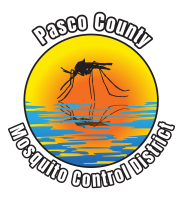Homeowner Tips
Homeowners can take the following steps to prevent mosquito breeding on their own property:
- Destroy or dispose of cans, old tires, buckets, plastic sheeting or other containers that collect and hold water.
- Do not allow water to accumulate at the base of flower pots or in pet dishes for more than 2 days.
- Clean clogged roof gutters.
- Check around faucets and air conditioner units and repair leaks or puddles that remain for several days.
- Stock ornamental ponds with fish.
- Change water in birdbaths, fountains, and troughs twice a week.
- Clean and chlorinate swimming pools.
- Turn over unused wading pools and other containers that tend to collect rainwater.
- Cover rain barrels with lids or screening.
- For Bromeliads and other plants that hold water flush or treat that standing water.

Repellants
Mosquito activity is generally the highest around dusk and dawn. If you know you will be in areas of high mosquito activity use any of the following repellants.
Insect repellants with DEET (N, N-diethylmetatoluamide) are very effective at keeping mosquitoes away. While DEET doesn’t actually repel mosquitoes it does “mask” us so mosquitoes can’t find us. Higher concentrations don’t work better, they just last longer. Follow the label directions when applying to your skin. DEET should be reapplied every few hours particularly if sweating.
There are also newer insect repellants such as Picaridin, IR3535, and Oil of Eucalyptus that are currently available for use. Now that you have alternatives, choose the repellant product that is right for you. Each will vary in their active ingredients, protection time, and insects that it repels.
Bat Houses
Although bats do eat some mosquitoes, they are a very small part of their normal diet. Mosquitoes have been shown to be less than 1% of a bats diet and the numbers consumed in one evening are often exaggerated. If you are interested in installing bat houses in your community, we support your efforts, but don’t do it with the hopes of controlling your mosquitoes.
Bug Zappers
They kill many insects, but do a very poor job of controlling mosquitoes.
Mosquito Misting Systems
PCMCD aligns with the American Mosquito Control Association (AMCA) concerns with the sale of outdoor time-released insecticide misting systems to homeowners and businesses as a means to control mosquitoes. These systems utilize various synergized formulations of natural pyrethrins or synthetic pyrethroids that are dispensed into the environment at intervals determined by the user. Some systems also utilize minimum risk, Federal Insecticide, Fungicide, and Rodenticide Act (FIFRA)-exempt pesticides to control or repel mosquitoes.
The position of PCMCD is that the practice of dispensing pesticides at predetermined intervals without surveillance data guiding the treatment is not consistent with the sound Integrated Mosquito Management practices that underlie our valued partnership with the Environmental Protection Agency (EPA) in the Pesticide Environmental Stewardship Program. We are concerned that application of pesticides through these misting systems will have several undesirable effects, such as contribution to resistance.
